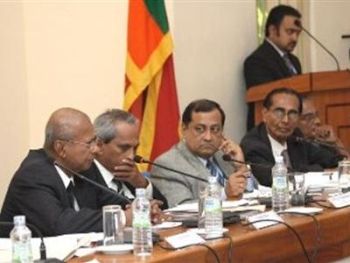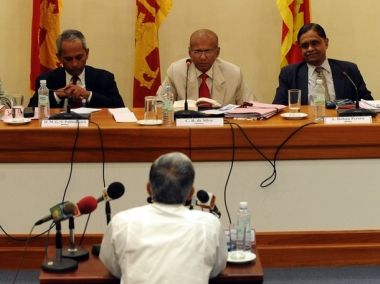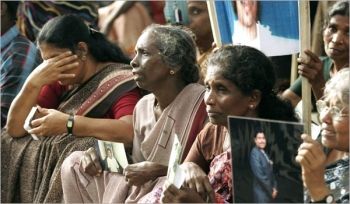
Publisher:
Bonnie King
CONTACT:
Newsroom@Salem-news.com
Advertising:
Adsales@Salem-news.com

~Truth~
~Justice~
~Peace~
TJP
Nov-25-2011 18:08

 TweetFollow @OregonNews
TweetFollow @OregonNews
Seen and Not Heard: Women in Sri Lanka's Reconciliation Commission
Jo Baker Special to Salem-News.comSri Lanka's Lessons Learned and Reconciliation Commission has just one female commissioner out of eight. For Tamil women, the LLRC simply reaffirms bad old habits.
 Sri Lanka's LLRC. Photo: globaltamilnews.net |
(LONDON) - If and when Sri Lanka’s Lessons Learned and Reconciliation Commission (LLRC) releases its report later this month, as scheduled, it will do so amid wide scepticism on many critical fronts – except, it seems, for one. The credibility, independence and the ethnic balance of the post-war commission have been well-challenged internationally, since it was established by the President last year to ostensibly help reconcile the nation.
But for the war’s tens of thousands of female survivors there has been little space and little said, by either the commission or its critics. The LLRC’s weaknesses in this area deserve greater attention. They also add significantly to the impression of an instrument trailing far behind modern truth and reconciliation efforts elsewhere.[1
Falling short of international standards
Many governments in countries recovering from conflict are taking steps to better include women in post-conflict processes, whether through peacekeeping strategies, reparations programmes or truth commissions. They do so to better secure lasting peace and stability -and to improve their image at home and abroad. New expectations have been set by international developments such as UN Security Council Resolutions 1325 and 1889 on women, peace and security, and advances in international criminal law.
 Former Sri Lankan diplomat Bernard Gunathilaka (back to |
These were bolstered by sustained women’s rights campaigning, and underscored by states’ legal commitment to equality. Under non-discrimination provisions, States must now show that they have strategies in place that will overcome the underrepresentation of women, and redistribute resources and power equally, and in the last decade or so experts have helpfully applied these to transitional mechanisms.
In the mid-nineties and early 2000s for example, South Africa and Peru’s Truth and Reconciliation Commissions (TRCs) were able to uncover the shocking scale of crimes against women during apartheid and internal conflict respectively, and then respond with gender-specific reparations and reforms. A few years later, commissions in Sierra Leone and East Timor built strongly on these improvements by broadly consulting women in their design and procedures, with mandates that explicitly took the gender of victims into account.
These steps and others show a growing acknowledgement that women’s concerns, needs and abilities have historically been a low state priority, and that they face greater barriers in accessing state machinery. They recognise that women generally experience conflict and displacement differently to men and that, in outnumbering them as survivors, they have greater post-war roles and responsibilities, and differing needs. And they show an improved understanding of the ways that truth commissions and commissions of inquiry (CoIs) have long worked from a male standpoint, excluding women from an instrument meant to shape a state’s future priorities and practices, and producing, as noted by the ICTJ’s Vasuki Nesiah, a ‘narrow and partial truth’ . 1
A voiceless majority
 Tamil mothers - Journalists for Democracy Sri Lanka |
In Sri Lanka, large numbers of mostly-Tamil minority women in the North and East are bearing the brunt of the post-conflict period. Displaced, widowed, injured and traumatized, many are primary carers for other maimed and traumatized persons in environments where resources are scarce and security concerns are extremely high. The military has replaced most civil administrative systems in the North and East, and reports on the increase of sexual assault throughout high-security zones are also citing a rise in prostitution, trafficking and STDs, since vulnerable minority women must now deal with male Sinhalese soldiers as part of their daily routines.2
Compounding their disadvantage is an administration perceived as having little interest in addressing legitimate minority grievances, sex equality or crimes against women, and which has presided over a widening gender gap.3
And added to this is the disabling effect of often stricter Tamil traditions and stigmas, which tightened during the war. These women therefore have specific needs, concerns and grievances that any post-conflict initiative will only be able to address, effectively and legally, with strong positive measures.
So it is critical to ask what the Government of Sri Lanka (GoSL) has done to ensure that the LLRC has served Sri Lanka’s women; particularly those from its beleaguered minorities. Floods of women may have clamoured to access the LLRC – as they did for a series of previous, similarly flawed Sri Lankan processes. But have they been able to effectively use them on a par with men? There is not the space to consider this in detail here: but it is possible to look briefly at what has not been done.
Lessons ignored
Similar commissions in East Timor, Sierra Leone and Peru, offer positive, recent examples. Between them they have: developed the use of outreach workshops that prepare and manage the expectations of female testifiers; employed staff with expertise in gender, and sensitive forms of statement-taking (to encourage the sharing of sexual or gender-specific violence); sent information through channels that women are more likely to understand; and have provided basic support, like food and transport costs, since many women work in the informal sector and are less likely to be compensated for missed hours.

They held public and private thematic sessions for women’s testimony of their experiences, expectations and needs, and programmes to address community stigmas for female breadwinners, or victims of sexual abuse. These features, among others, have allowed for some rehabilitation on both individual and social levels, among men and women.
The LLRC (and predecessor processes in Sri Lanka) can boast few if any of these features. Instead it has been criticised for demonstrating a bias to (male) seniority and for spectacularly failing to address the emotional needs of victims, or ensure their physical security.
Women have been chastised and disregarded for crying while testifying, received little help in negotiating the system, have been told to write their submissions rather than speak them - on forms only in Sinhalese and English, and have in various ways have been left profoundly frustrated, stigmatised and intimidated.4.
Yet sex discrimination runs deeper than a commission’s operation. As pointed out recently by experts, bias afflicts the very framing of truth, and the prioritising of certain violations and victims over others. Most of the women in Sri Lanka, as in many war torn countries, clamour to be accepted as mothers, sisters and daughters of victims – but rarely as victims in their own right.
This leaves violations such as sexual or structural violence, unrecognised and underreported. In some countries like Peru, the creation of gender units allowed for investigations into the harms that affected women during conflict, and for the weaving of these findings throughout the final report and its recommendations.
In Peru, a Declaration of Forced Disappearance (released by the Ombudsman’s Office) was recognized as particularly valuable for women, in terms of their rights to property, inheritance and remarriage, and was prioritised as a result. (This brings to mind the continuing difficulties of Sri Lankan families, many female-headed, on obtaining death certificates). In other commissions, such as Sierra Leone and East Timor, gender was written into the mandate as an avenue for investigation, which helped expose the reality of gender-based torture and contributed to law reform efforts.
The LLRC has no mention of gender in its mandate and no dedicated expertise related to women; it has just one female commissioner out of eight, and has given little attention to drawing out the significant violence and deprivation experienced by women as a result of the conflict (particularly that of a sexual nature). Its time span also excludes the months following the war, which gave rise to many reports of human rights violations against female IDPs.
The power and promise of national exercises like the LLRC, lies in their ability to access the voices of the marginalised and build them into the nation’s memory. But for Sri Lanka’s Tamil women, the LLRC has simply reaffirmed bad old habits, as the report will very likely show. It is time for both those who control and who challenge Sri Lanka’s transitional justice mechanisms, to do so with sex equality in mind.
[1] For full references and deeper analysis on this issue, please refer to the original legal study: Baker, Jo (2011) Reconciling Truth and Gender: Lessons for Sri Lanka, London, available at:http://www.jobakeronline.
1 Nesiah, Vasuki (2006) Gender and Truth Commission Mandates (paper presented at Open Society Institute (OSI) forum on Gender and Transitional Justice, February 7, 2006), available at <www.ictj.org
2 International Crisis Group (18 July 2011) Reconciliation in Sri Lanka: Harder than Ever, Brussels: International Crisis Group; Iqbal, Rajani (23 October 2010) Women in Postwar Reconstruction and Reform in Sri Lanka, a presentation made at the Third Annual Conference of the Tamil Women's Development Forum in London.
3 Please refer to the 2011 Concluding Observations of the CEDAW Committee, its shadow report by the Women’s Media Collective, or The World Economic Forum Global Gender Gap Report 2011, released last week
4 Amnesty International (September 2011) When will they get justice? available at http://www.amnesty.org.uk/
 |
Jo Baker is an independent researcher and writer, with a focus on social exclusion, conflict and gender.. She holds an MA in Human Rights Law from the School of Oriental and African Studies, University of London, and formerly ran a programme at the Asian Human Rights Commission in Hong Kong. Her legal study, ‘Reconciling Truth and Gender: Lessons for Sri Lanka’ features in the December 2011 issue of the Law and Society Trust Review. A selection of her other academic projects, advocacy work and articles can be found at
Articles for November 24, 2011 | Articles for November 25, 2011 | Articles for November 26, 2011



Quick Links
DINING
Willamette UniversityGoudy Commons Cafe
Dine on the Queen
Willamette Queen Sternwheeler
MUST SEE SALEM
Oregon Capitol ToursCapitol History Gateway
Willamette River Ride
Willamette Queen Sternwheeler
Historic Home Tours:
Deepwood Museum
The Bush House
Gaiety Hollow Garden
AUCTIONS - APPRAISALS
Auction Masters & AppraisalsCONSTRUCTION SERVICES
Roofing and ContractingSheridan, Ore.
ONLINE SHOPPING
Special Occasion DressesAdvertise with Salem-News
Contact:AdSales@Salem-News.com


Terms of Service | Privacy Policy
All comments and messages are approved by people and self promotional links or unacceptable comments are denied.
[Return to Top]
©2026 Salem-News.com. All opinions expressed in this article are those of the author and do not necessarily reflect those of Salem-News.com.